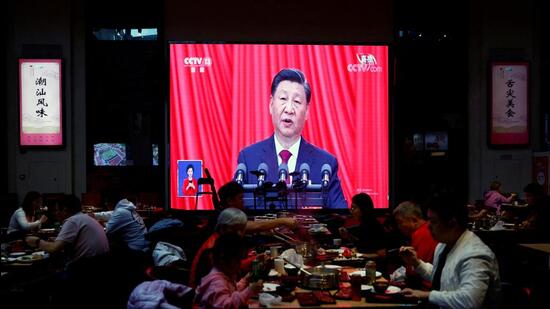China Party Congress: With Xi set to secure third term, Taiwan fast becoming top priority
Taiwan is gaining primacy in China’s overall foreign policy doctrine given that the island has become an active theatre of diplomatic battle between the US and China
Beijing: President Xi Jinping’s upcoming term as the ruling party’s general-secretary is expected to see more aggressive Chinese military activity around Taiwan, with Beijing becoming increasingly sensitive to any engagement between the self-governed island -- that it claims as its own -- and a third country.

Xi, 69, is likely to secure an unprecedented third-term as the leader of the Communist Party of China’s (CPC) on October 23 at the conclusion of the party’s once-in-five-years national conclave.
At the opening of the party’s 20th National Congress on Sunday, Xi’s assertion that China will never “renounce the use of force” to reunify Taiwan with the mainland received enthusiastic applause from the delegates present.
But, his statement received immediate derision and flak from Taiwan, with the presidential office saying Taipei will never compromise on its sovereignty, freedom and democracy. The Taiwanese oppose Beijing’s “one country, two systems” plan for the self-governed island, it added.
While Xi used the phrase “peaceful reunification” in his speech, given that, within Taiwan, the majority seems to be against merging with the mainland, a “peaceful reunification” does not seem possible.
Taiwan is gaining primacy in China’s overall foreign policy doctrine given that the island has become an active theatre of diplomatic battle between the US and China, over Washington’s increased interactions with Taiwan in the form of arms sales and high-profile visits.
To China, that’s interference in its internal affairs.
Tensions between Beijing and Taipei reached a new peak in August when US House Speaker Nancy Pelosi visited the island, despite warnings from Beijing, including Xi telling US President Joe Biden “not to play with fire”.
“Without a doubt, Taiwan will remain a top political goal for Xi. Through his heavy-handed response to the Pelosi visit Xi already set a new normal in the intensity of his intimidation campaign against Taiwan,” said Zsuzsa Anna Ferenczy, assistant professor at National Dong Hwa University in Taiwan.
“To not lose any of his momentum, Xi will now work on maintaining the new normal and regularise the latest measures taken, and continue to combine the coercive measures in the coming months,” Ferenczy said.
Taiwan’s presidential election in early 2024 will be critical factor in deciding Beijing’s attitude towards the island. If the ruling Democratic Progressive Party (DPP), which is against a reunification, returns to power, Beijing is bound to express its discontent in some way, which could included more military drills.
“I think China, more and more, is considering using force against Taiwan,” said Oriana Skylar Mastro, a Centre Fellow at Standord’s Freeman Spogli Institute for International Studies, where she focuses on Chinese military and security policy.
“So, I think in the next few years, it’s almost guaranteed that we’re going to see sort of lower level conflicts and disruptions; blockade doesn’t have to be, for example, a complete blockade. They (China) could do something like (a blockade) for a week or two just to teach Taiwan a lesson if they don’t like what happens in the next election, for example,” Mastro said.
Xi is closely tracking the Western sanctions imposed on Russia after Moscow invaded Ukraine in February, especially because, according to Ferenczy, they are something he would want to avoid.
“[Sanctions are] something Xi would want to avoid at all cost for himself so that he can continue to pursue his development trajectory (for China),” she said.
In that way, how Russia’s war unfolds in the coming months will also be a factor Xi will carefully consider when developing his Taiwan strategy, especially in the decision to use force to takeover the island.
“In the meantime, the options are many to pressure and intimidate, and undermine and isolate Taiwan,” Ferenczy said.
Those measures could include disinformation and cyberattacks, economic coercion and military provocations. Beijing’s belligerence over the “one China principle” might also make other countries, including India, wary of strengthening their ties with Taiwan.
“Xi’s aim will not change, namely, to deter Taiwan from further internationalising itself, and to deter democracies from further engaging Taiwan,” Ferenczy added.



